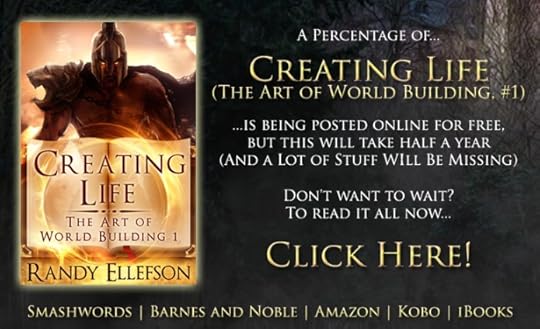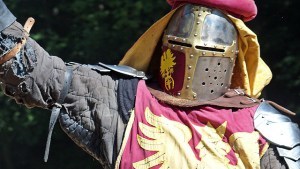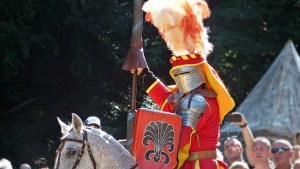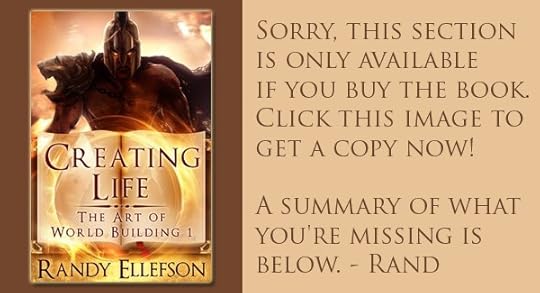Randy Ellefson's Blog, page 36
November 30, 2017
What Steed Does Your Hero Have?

Steeds and ships (especially in SF) have a special place as a companion or a trusted way out of tricky situations. Audiences can become attached to them (like the Millennium Falcon of Star Wars), and that’s what we want. In the section, we learn how to create them!
November 27, 2017
What Gear Does Your Hero Have?
A hero or villain with cool stuff excites the imagination. Who doesn’t like Jedi Knights with light sabers (Star Wars)? Or albino weaklings with a sword that devours souls and transfers the victim’s energy to the wielder (Elric of Melnibone)? Or a warrior with a fierce bird that would devour lesser men but obeys him (Tarl Carbot of the Gor Series)? Run of the mill items are nothing to get excited over and won’t become famous and are probably not what we’re looking for here. Jewelry, weapons, and animals can all be memorable possessions, but it’s arguably better to choose one or two for each character. Otherwise the law of diminishing returns kicks in and the impact of each item becomes diluted by the existence of the others.
When deciding what our character has/had, consider giving them something suited to our purpose and their status. If they’re a warrior, a weapon is an obvious choice. This can be one that achieved a famous result (such as it’s the sword/gun that killed a certain bad guy) or one that was just generally used by them and had a special property that made it famous. Maybe the weapon was altered in some way, either a piece removed or something added to alter its functionality, power, or speed.
Armor is less exciting. Armor that saved our guy makes them a little weak, by comparison; we like people who save themselves. But it might allow them to enter something like a supernatural phenomenon no one else could enter, for example. But if the armor became cursed—or was all along—that’s better, especially if it’s still around on our world or believed destroyed (but isn’t). What if the armor compelled them to do dangerous missions, as if it had a mind of its own? This is one way to meld a famous character with a famous item.
An item they are always seen with can also acquire a mythic reputation. A wizard’s staff comes to mind, as does any outfit they typically wear or an item they use on their adventures. Something small like a ring is unlikely to capture much attention unless it has a giant diamond in it, for example. A necklace or belt are progressively more likely to get noticed, as is anything worn on the head.
Broken items are another area of interest. Can it be put back together? Some or all of the pieces might be lost. Decide who broke it, why and when, what led to this, and the aftermath. Was there a defeated hero/villain, a chaotic artifact, or explosion (one that created a monster)?
How did our character acquire this item? Maybe it was found on an adventure, bestowed, or forged for them. It could be standard equipment that just has a fearsome reputation. Have they ever lost it and if so, with what consequences? Did they recover it? Perhaps it’s no longer the same or has changed in some way, which might be significant. It could still be useable or dangerous in the wrong kind of way now. They may keep the altered item out of loyalty. Did anything happen to our character because they no longer had it?
If the item is still lost, is our character looking for it or have they given it up? Do you intend them to find it? Do you have any ideas who has it now? Are there any consequences if someone ill-equipped to handle it has it? This can apply to items that our gods have as well. In addition to weapons, armor, clothing, books, and devices to help with mundane or extraordinary tasks like food, shelter, and communication, we also have steeds and ships to consider (see the next section).
Did they get it by gambling? Maybe it was a trade deal, such as someone selling it without having any idea of its true value, which was then discovered by our character. The possession could have been the result of a quest our character went on specifically to find it.
Do others covet the item, causing our character to need to protect it? Either way, in a world with thousands of years of history, there are plenty of interesting items to be found and which no longer belong to their original owner; this goes up exponentially across multiple planets.
We might want to figure out who created the item. Did our character do it themselves? This is more likely if they’re a wizard or engineer. We can also create a history for this item making its way through multiple hands, possibly causing problems along the way, most famously with our character?

November 24, 2017
Why Is Our Hero/Villain Famous?
Our character is famous for something. This is the reason we’re creating them. What are we hoping to achieve? Do we want someone whose name people fear to invoke? Someone to inspire others in times of trouble? Someone who is an example, good or bad, of what’s possible? These motives (for us) needn’t be dependent on stories we intend to tell. Our purpose is to have someone for our characters to admire, so what we need at the outset is a basic purpose for this person and how and why they are so revered or loathed. This can be a one liner in our notes: “He said a prayer to Lord Vallen, who at the Battle of Westin saved King Harin at the cost of his life and in so doing restored honor to the tarnished knighthood.”
Whatever our character’s fame, there are bound to be details about them, their life, their story, and even what they did that people are wrong about. Maybe others have wishful thinking that someone was a certain way. People idolize heroes, ignoring ugly details, such as adultery or alcoholism. People demonize villains and ignore that they might’ve been truly devoted to their children. These exaggerations are part of humanity, at the least. When inventing your person, decide what people have right and wrong about them. Are there little known facts that might (or might not) change how they’re viewed?
Dead or Alive
 Decide if they’re dead or still alive. If deceased, are they really dead or just presumed so? How did they die and was this satisfying in some way to the audience or characters? They could be incorrectly identified as dead and just be missing. If so, decide who the last person to see them was. Maybe they faked their death. We should have a reason and decide on the circumstances of that. What will cause them to return?
Decide if they’re dead or still alive. If deceased, are they really dead or just presumed so? How did they die and was this satisfying in some way to the audience or characters? They could be incorrectly identified as dead and just be missing. If so, decide who the last person to see them was. Maybe they faked their death. We should have a reason and decide on the circumstances of that. What will cause them to return?
Are they imprisoned and is that known or not? If jailed or exiled, decide where, for how long, and why. The prison may have special properties or a unique location. How do they feel about being jailed (i.e., is it justified and do they agree?)? Maybe there’s a release date everyone’s worried about and preparing for. Have people become complacent about the threat this person poses so that they’re easy prey when he returns without warning?
If the character is still alive, are they retired in old age, or out and about still doing things to add to that fame? Are they okay with that fame or hiding from it? Does anyone think they’re past their prime? And how does our person feel about being viewed that way? Do they resent it or agree, perhaps sheepishly?
Our world has history and some if not most of these figures will be long gone (or at least thought to be—immortality, or the near equivalent, gives us options). Characters we’ll never use except as a reference don’t need much development, so when filling out the template in Appendix 3, don’t spend too much time on each section. It’s living people that benefit from more thought.
We might decide someone is too much fun and we’ll keep them around, changing their status to living, but this can cause a problem if we’ve tied the events of their life to the events of our world history and can’t change it. But we can always write a story set in the past.

November 20, 2017
Creating World Figures
 No book on world building would be complete without mention of those who live there, as they are arguably the whole point. That said, the creation of people will depend on our goals. If we’re world building for gaming, then our world needs characters for the gamers to interact with. If we’re a writer, then characters might be best suited to the stories we intend to tell.
No book on world building would be complete without mention of those who live there, as they are arguably the whole point. That said, the creation of people will depend on our goals. If we’re world building for gaming, then our world needs characters for the gamers to interact with. If we’re a writer, then characters might be best suited to the stories we intend to tell.
Since this isn’t a book on writing, I won’t delve into the details of building memorable characters, because the goal of this chapter is to create well-known figures. Nonetheless, much of what follows can help us build characters. These are people we can reference at any time but which might not figure into a story. For example, on Earth we have Elvis, Oprah Winfrey, Tom Cruise, Tom Brady, Jesus Christ, Hitler, and the boy who cried wolf. In other words, a musician, television personality, actor, athlete, religious figure, dictator, and cautionary tale. In our world, we might replace them with wizard, knight, priest, and martyr. Or star fighter, bounty hunter, emperor, and Jedi knight.
Appendix 3 is a template for creating a world figure. It includes more comments and advice, and an editable Microsoft Word file can be downloaded for free by signing up for the newsletter at http://www.artofworldbuilding.com/newsletter/
Types
Our world could benefit from heroes, villains, martyrs, and others who’ve become famous for whatever reason, such as physical traits, supernatural ones, or their role in world events. There isn’t much difference between one type and another when it comes to inventing them, aside for the reason they’re famous. Figure out what sorts of individuals are likely to be well remembered. This will give us a list of people to invent. Adding a touch of detail to the list will help inspire us. For example:
A knight who turned the tide of war, maybe by sacrificing himself
A knight who restored tarnished honor in the knighthood by doing something heroic
A wizard who made people fear wizards
An assassin who killed an emperor and triggered war (or stopped it)
A passionate priest and good orator who inspired many to follow a god or way of life
An influential leader who was assassinated/martyred, causing great social change
A dictator who wanted to exterminate a race and caused large scale war
A warrior known for incredible prowess but brought down by mundane health concerns
A famous explorer whose ship vanished
If you’re wondering where I got some of those, here are some inspirations in no particular order: Martin Luther King, Bruce Lee, The Princess Bride, Dragonlance, and Hitler. By summing them up without their names, we start the process of making them our own and continue by creating details.

November 13, 2017
Where to Start Inventing a Species
A top-down approach to inventing a species means viewing a species at a high level and working our way into details. We might decide on a sea-dwelling species and then face more detailed questions, like whether they have gills or can survive out of water. Can they walk on land? Are they seen often or rarely?
The bottom-up approach means creating details first and then slowly integrating them into a unified whole. Maybe we first decide on a species with sharp claws, a barbed tail, and which is rumored to carry people off at night while seldom being seen, and there’s almost no trace of where it went. From this and other details, perhaps we decide this species is water-dwelling and the claws and tail are used for catching fish. The reason people disappear is that they’re taken underwater and drowned, or perhaps held captive in underwater caves that have oxygen pockets, and since our species quickly enters the water from docks, there’s no trail to follow. This big picture is suggested by details we created first.

November 9, 2017
How Does Your Species Fight?
 http://www.books2read.com/creatinglife
http://www.books2read.com/creatinglife
Deciding on our species’ morale, society, personality, and body (including dexterity, agility, strength, and constitution), will help us decide on their combat skills. Learn more by getting a copy of Creating Life.
November 6, 2017
Can Your Species Use High Tech Stuff?
In a fantasy setting, technology means things like forging steel weapons, plate armor, or chainmail—the trade of blacksmiths, who are held in high regard. There are more rudimentary elements that our audience is unlikely to care about, including plumbing, irrigation, aqueducts, water wheels, and general tools for farming (a wood plow vs. an iron one). These are generally assumed to exist, but the question here is whether our new species is capable of such industry. Do they have architects smart enough to build structures that withstand storms and earthquakes? Can they build fortifications? Is the technological level enough to create more sanitary living conditions?
If not, they’ll have to go without, live among those who do, or get these things by other means, whether stealing, buying, or conquering. They might have allies who’ll agree to trade and train them in how to achieve something on their own.
Science Fiction
In SF, we think of technology as being far in advance of our own on Earth, not the sort of rudiments mentioned under the fantasy section above. Is our species able to design and build machines of any kind, not to mention something far beyond current human capacity? This requires intelligence, education and infrastructure for mining, refinement, chemistry, and more. Do we envision that they’re chemists, engineers, and physicists? If not, they must steal everything, with it being more likely that they’ll steal an entire ship, for example, rather than the parts to assemble one; this would be true of most if not all other technologies.
Can we assume that some of these intellectual capacities and skills, like engineering, are needed to operate machines? That depends on our goal. Creators often grant spaceships advanced artificial intelligence (A.I.) that takes care of many functions. This gives a less than brilliant species far more opportunities, just as a gun allows a child to kill a samurai. Do the builders of these machines account for that and require more intelligence to operate something, or biometric security? A good approach would be a mix of these styles so that we can decide, based on our story needs, which option is in effect. For example, one species could make everything easy to operate while another does not. A third species that is contemplating stealing something would take this into consideration.
 Decide what their life with technology is like. An ignorant and uneducated species can enjoy life in space even if they’re not in command, because every space ship needs janitors, for example. This subservient position is something to keep in mind because it greatly broadens opportunities for them. While they might be in unenviable positions, they can still get around, and there’s the mutiny idea of such a species taking over despite their limited technological skills. Maybe they bribe ship’s officers into helping them. With some ingenuity, we can find a way to empower a weaker species.
Decide what their life with technology is like. An ignorant and uneducated species can enjoy life in space even if they’re not in command, because every space ship needs janitors, for example. This subservient position is something to keep in mind because it greatly broadens opportunities for them. While they might be in unenviable positions, they can still get around, and there’s the mutiny idea of such a species taking over despite their limited technological skills. Maybe they bribe ship’s officers into helping them. With some ingenuity, we can find a way to empower a weaker species.
Maybe our species steals or captures ships and is smart enough to operate but not maintain them; if something goes wrong, the crew might be stranded. Are they known for having to send out distress calls over this? It would likely get them captured and arrested, but they probably know all about this problem and travel in pairs, for example, the still-functional ship rescuing the other’s crew before everyone flees. They might also set traps, taking over a ship that comes to help them, whether they really need that help or were just setting someone up.
More advanced species will be the ones inventing technology and trying to safeguard it. They’ll be the victims of ruses by those species who can’t create these things. How has this changed or hardened/softened attitudes and laws about theft and tampering? With biometrics, devices could be set to only work with one species. We can invent all sorts of safeguards and ways of defeating them.
Not every species’ society which lacks the ability to create technology will be “evil.” Some might need the protection of another benevolent species. They might be taken advantage of by a nefarious one. There can be attempts to exterminate them or make them slaves. Fear about such outcomes could drive them to seek alliances, which may carry risks of their own.
If our species lack a society capable of producing technology (of whatever sophistication level), they may still be part of a mixed-species society that does indeed have the sophistication to create technological wonders. In this scenario, the smarter members of our species might be capable of gaining education, unless the society forbids them from doing so; a reason for that restriction is preferred, such as misuse of advanced information in the past. If our species can gain skills needed, they could introduce them to their own society with one degree of success or another.

November 2, 2017
How Does Your Species’ Do Magic?
 http://www.books2read.com/creatinglife
http://www.books2read.com/creatinglife
If our world has the supernatural, we should decide our species’ relationship with it. This includes not only magic but phenomena – and even the power of the gods coursing through them, like the healers of Dungeons and Dragons.
October 31, 2017
What Are Your Species’ Relationships Like?
Unless this species is the only one in our work, we need to decide how they relate to humans and other species of our invention, or any public domain species we’re using. Inventing this tends to be easier when we’ve created other aspects first, like appearance, habitat, and world view. Ideas can form during those processes. Giving this time and not forcing it can help, as can imagining interactions as if we’re writing scenes between them and others. Then think about why you have them acting the way they do. Use various situations that are likely to occur, such as greetings, farewells, dining etiquette, and how they react to various kinds of news that impacts their fortunes.
We must be sure to decide how two invented species interact. Using elves and dwarves as examples, it’s easy to fall prey to deciding how humans get along with elves and dwarves but not deciding how elves and dwarves get along with each other. A single paragraph is often enough to get started. We’re looking for high level ideas. Anything more detailed can arise while creating stories.
Are they enemies? Friends? Why? Are their legendary battles or animosities? Treaties? Are they allies now but some among them have bad blood? Every species should have opinions and prejudice about others, and humans should feel or think something stereotypical about everything we create (because we do that). There should be classic misunderstandings. Some of our characters should exemplify these ideas while others rise above them. It adds conflict and dimension. We can start with Earth analogues.
Is it normal for one to smash furniture on hearing bad news? Punch a wall? Or react stoically as if nothing has occurred? While these have nothing to do with relationships, the way others perceive them is certainly affected and in turn impacts relationships. If our species literally kills messengers, others aren’t going to send them, for example, unless wanting to get rid of someone that way. More to the point, the species would be see as temperamental by others and this will change how people deal with them. Reputations are born of such things.
Human Commentary
A well done species can allow the author to make commentary about humans, which in turn helps our audience relate to our work. We can craft our species to do this. Feel we’re dishonest? Make your species honest. Think we jump to conclusions? Make your species slow and deliberate in its evaluations to the point that it bugs humans. If you think humans are faithful to gods, create a species that is quick to turn its back on gods if not answered, making us look good by comparison. Maybe our species doesn’t understand the concept of property and just takes other people’s stuff like it’s no big deal and we accuse them of being thieves. Any social or cultural expectation of ours can be turned on its head, an opposite expectation given to another species to cause conflict with not only humans, but other species.

October 23, 2017
What is Your Species History?
 http://www.books2read.com/creatinglife
http://www.books2read.com/creatinglife
We should decide on our species’ history to make them more believable. If they originated in one place and have spread far, this could have implications we’d want to leverage.



